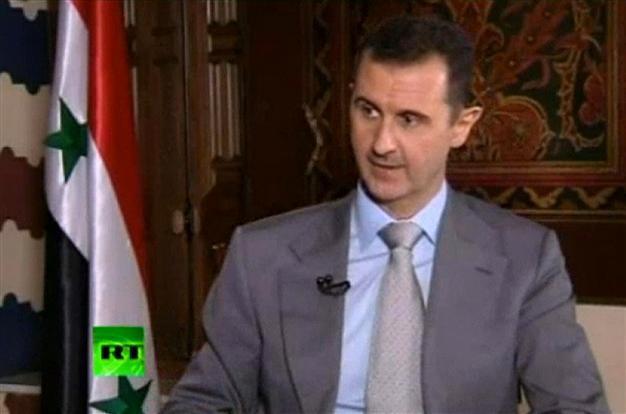'Erdoğan thinks he is a Caliph', says al-Assad
ISTANBUL

In this image made from video, Syrian President Bashar Assad speaks with English-language television channel Russia Today recorded at an unknown date in Damascus, Syria. AP photo
Syrian President Bashar al-Assad has claimed that Turkish Prime Minister Recep Tayyip Erdoğan thinks of himself as a Caliph, and has accused Turkey of looking at Syria with imperial ambitions, in an interview given to the Russia Today on Nov. 9."Erdogan thinks that if the Muslim Brotherhood takes over in the region - and especially in Syria - he can guarantee his own political future. He also personally thinks he is the new Ottoman sultan and that he can control the region as it was controlled during the Ottoman Empire under a new umbrella," al-Assad said.
"In his heart he thinks he is a Caliph. These are the main reasons for him to shift his policy from zero problems to zero friends," he added.
The Syrian president also denied the possibility of war breaking out between Turkey and Syria. "The conflict or difference is not between the Turkish people and the Syrian people. It is between the governments and the officials; it is between our officials and their officials because of their politics. So, I do not see any war between Syria and Turkey on the horizon."
Al-Assad refused claims that shells hitting Turkey were sent by the Syrian government, saying it is impossible to know the origin of these shells as there are many "terrorists" with mortars on the border.
"The Syrian army does not have any orders to shell Turkish land because we do not have any interest in doing this, and we do not have any enmity with the Turkish people. We consider them brothers, so why would we do it? If it happened by mistake then it needs investigation," he said.
Assad denies committing war crimes
MOSCOW - Agence France-Presse
Syrian President Bashar al-Assad denied that his regime was committing war crimes in the conflict with rebels, saying the army was engaged in "fighting terrorism", in an interview with Russian television broadcast Friday.
"We are fighting terrorism. We are implementing our constitution by protecting the Syrian people," Assad told Russia Today (RT) when asked about accusations Syrian government forces were committing war crimes.
The UN Human Rights Council has created a commission including former war crimes prosecutor Carla del Ponte to investigate human rights abuses in Syria committed by all sides, although it has yet to gain access to the country.
Assad defended the Syrian army, saying that "if you have an army that committed a crime against its own people, this is devoid of logic because the Syrian Army is made up of Syrian people." "The army cannot withstand for twenty months in these difficult circumstances without having the embrace of the public in Syria," said Assad.
Assad in turn accused the rebels of committing war crimes, noting reports by Amnesty International and Human Rights Watch which he said had found evidence of war crimes by his opponents.
But the UN has also urged probes into a range of alleged atrocities by the government, including the slaughter earlier this year of hundreds of people in the southern Syrian town of Daraya.
Assad sought to back his argument by referring to Russia's campaign against separatist and Islamist rebels in Chechnya over the last two decades. However Russian rights groups have long accused the Kremlin of committing atrocities in the Caucasus.
"They (Chechen rebels) attacked people in theatres and schools and so on," said Assad, referring to the deadly hostage sieges at the Moscow Dubrovka theatre in 2002 and a school in Beslan in 2004.
"And the army in Russia protected the people, would you call it war crimes?" he asked.
Assad says only 'ballot box' can decide his future
Syrian President Bashar al-Assad said his future could only be decided
through the ballot box, in an interview with Russian television where he
warned the country could face a protracted war.
Assad told
Russia Today that whether the president can "stay or leave" is a
"popular issue" and "the only way (it) can be done (is) through the
ballot boxes". He denied Syria was in "civil war" but said the conflict
with rebels could be "a long-term war" if they continued to receive
support from abroad.
















